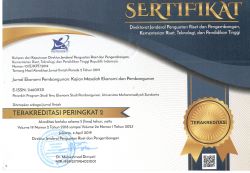Food Insecurity during a Pandemic: System Thinking-Based Analysis
Dina Yulianti(1*), Mu'min Elmin(2), Eddy Prahasta(3)(1) Faculty of Social and Political Science, Universitas Padjajaran
(2) Faculty of Social and Political Sciences, Universitas Sulawesi Barat
(3) PT Dirgantara Indonesia
(*) Corresponding Author
Abstract
The Covid-19 pandemic has had a terrible impact on human security. On the one hand, human health is threatened by a mysterious disease that has not known the best way to cure it. On the other hand, efforts to prevent this disease’ spread pose another threat to human security, namely food security. Since the 1990’s, global food distribution is carried out under the global food regime’s governance, which results in many developing and low-income countries depending on imported food. The closure of borders and markets, the imposition of quarantines, and cut off transportation routes have disrupted the global food supply from producers to consumers. As a consequence, food supplies are also under threat, and global food prices are rising. Meanwhile, the economic downturn due to the pandemic has left many people unemployed, fall into poverty, and their ability to access food is reduced. Lack of access to food creates food insecurity conditions. However, it cannot be ignored that low domestic food production and global food insecurity are particular problems that have occurred long before the pandemic. Underlying this condition, this study aims to investigate the primary cause of food insecurity. This study finds the need for a radical paradigm shift of the government in viewing the concept of food security and then convert to food soverignty.
Keywords
Full Text:
PDFArticle Metrics
Abstract view(s): 841 time(s)PDF: 646 time(s)
Refbacks
- There are currently no refbacks.
















